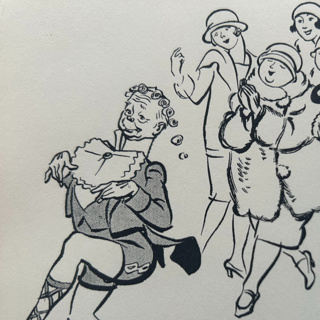
259. Major error, major success, Major’s out
We’re just about ready to move on from John Major but, before we do, we need to spend a few moments on two major events of his second premiership. One was a significant breakthrough, in Ireland, even if it didn’t go to completion under his administration; the second, his back-to-basics campaign, was an unqualified disaster.The first of the two problems with ‘back-to-basics’ is that going backwards isn’t a slogan that appeals much to voters. The second is that it feels like an appeal to morality, and there couldn’t have been a worse time for that kind of appeal in the Conservative Party: it was engulfed over the coming years by a whole string of scandals, many sexual but some more simply corrupt, involving such actions as MPs taking money to ask helpful parliamentary questions.On Ireland, Major got the peace process really motoring, with support not just from the Republic of Ireland but even more significantly, from the US. If things ground somewhat to a halt in the last year or so of his premiership, that was mostly down to the Provisional IRA ending its ceasefire, in response to Major’s apparent over-readiness to accommodate the Northern Ireland Unionists. That, in turn, was mostly down to his having lost his parliamentary majority and therefore having to depend on the Unionists to cling on to office.That he did, calling the 1997 general election at very close to the last possible moment. But the atmosphere of sleaze created by the scandals, the unpopularity of moves such as railway privatisation, and the perception that the Tories were increasingly split (over Europe) sank his party in voters’ views. The election, on 1 May 1997, gave a landslide Commons majority, even larger than Thatcher’s, to Tony Blair and Labour – or, to use his language, New Labour. He reckoned Labour had won thanks to ‘a vote for the future’. It looks like going forward to the future resonated better with voters than heading back to basics.Illustration: John Major at the 1993 Conservative party conference, detail from a photograph by Malcolm Gilson/Rex Features, from 'The Guardian'Music: Bach Partita #2c by J Bu licensed under an Attribution-NonCommercial-No Derivatives (aka Music Sharing) 3.0 International License
7 Sep 14min
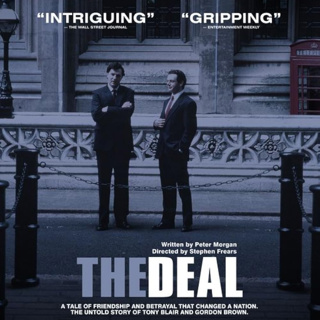
258. Major’s bastards and Labour’s deal
By winning the 1992 general election, John Major had gained his own mandate to form a government, instead of imply inheriting Margaret Thatcher’s. He’d shown himself capable of leading the Conservative Party to success, as he led it to a fourth successive election win. He’d emerged somewhat from the shadow of his Iron Lady predecessor. And then things immediately started going wrong. Black Wednesday, just months after the election, saw a major run on the pound that turned George Soros into ‘the man who broke the Bank of England’ and drove Britain out of the European Exchange Rate Mechanism. Major’s positive poll ratings collapsed overnight and never really recovered.Then his own party began to creak as its seams, as a growing group began to emerge and express an increasingly strident Euroscepticism. That group mounted a rebellion against the government’s proposal to ratify what came to be known as the Maastricht Treaty, which converted the European Economic Community into the European Union, with more ambitious aims towards integration (from some of which Major obtained British opt-outs). Though eventually the sceptics voted with their own party’s government to avoid bringing it down, their behaviour had been so objectionable to Major that, in an unguarded moment with a journalist, he referred to them as ‘bastards’.Meanwhile, in the Labour Party, John Smith, the well-respected leader who’d replaced Neil Kinnock after the general election defeat, died suddenly of a heart attack. There were two frontrunners to take over from him, Gordon Brown and Tony Blair. It seems clear that they came to a deal whereby Brown would stand down as a candidate for the leadership to give Blair a clear run, in return for a big role in a future Labour government.Blair took over from Smith. He’d be leading Labour against Major’s Conservatives at the next general election. Our subject for next week.Illustration: promotional image for Stephen Frears’ The Deal, showing David Morrissey as Gordon Brown and Michael Sheen as Tony BlairMusic: Bach Partita #2c by J Bu licensed under an Attribution-NonCommercial-No Derivatives (aka Music Sharing) 3.0 International License
31 Aug 14min
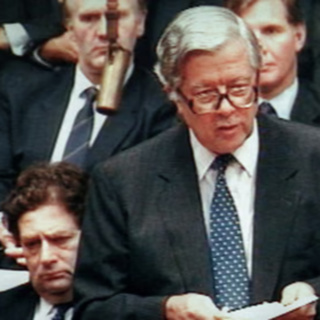
257. Iron Lady out, Grey Man in
With the poll tax, Thatcher took one bad decision to many. From the point of view of orthodox Thatcherite thought, it sounded like a good idea. She’d been working for years to shrink the state but, while she could herself cut public spending at national level, local government could keep racking it up if it so chose. She’d introduced rate capping to limit how far local councils could raise local taxes. The poll tax – officially the Community Charge – was the next step. In the old system, with local taxation based on house values, it was the rich that paid the most even though it was the poor that mainly benefited from local services. A flat rate tax per head – which the Community Charge was, hence the derogatory name Poll Tax – would, the theory suggested, give poor voters a direct relationship with local taxation and expenditure, making them less likely to vote for council candidates who would push for increased local spending.In fact, the tax was seen as unfair and its introduction led angry protests that on occasion led to rioting.It wasn’t, though, the poll tax that directly ended Thatcher’s time at the top. Instead, it was another row with one of her closest colleagues. Already Michael Heseltine, in 1986, and Nigel Lawson, in 1989, had been significant figures – so-called ‘big beasts’ – leaving her government. Now, in the autumn of 1990, she fell out with Geoffrey Howe. He too resigned and in his resignation speech talked about how his loyalty was divided between Thatcher herself and the country or party. The day after his resignation, Heseltine announced he would challenge Thatcher for the Tory leadership. In the resulting election, like Heath against her, she won the first round but by too narrow a margin to prevent a second round. Like Health against her, she resigned.It wasn’t Heseltine, however, who replaced her. On the contrary, much to many people’s surprise, it was John Major, who’d only been elected to parliament in 1979 and only served in cabinet since 1986, who came through as the compromise candidate Tory MPs could rally behind. He became party leader and Prime Minister.And then, much to everyone’s surprise again, he went on, partly helped by campaigning errors by Neil Kinnock’s Labour Party, to win the election in 1992. The Tories had won four general elections in a row. But now that would return the grey man to Downing Street rather than the Iron Lady.A very different proposition…Illustration: Geoffrey Howe delivering his resignation speech to the Commons, 13 November 1990, with Nigel Lawson sitting next to him. Photo PA from the Guardian.Music: Bach Partita #2c by J Bu licensed under an Attribution-NonCommercial-No Derivatives (aka Music Sharing) 3.0 International License
24 Aug 14min
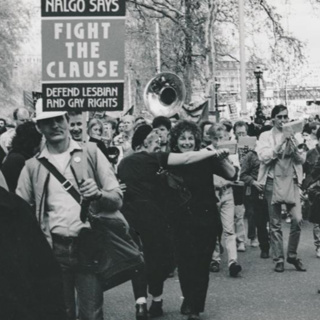
256. Maggie losing it
Having looked last week at how Maggie Thatcher was running out of options for how to carve out a new role for Britain on the world stage, this week we look at how things were going at home. After all, she’d won a second landslide Commons majority in 1987, and that ought to be enough for anyone to shape politics to their wishes.Well, it turned out not be that easy. Though it didn’t go far at this time, this was when the first stirrings for devolution, and eventually perhaps even independence, began to emerge in Scotland and Wales. After all, they’d been held together with England in Britain when there was a British Empire, and with that Empire gone, what held them together now?And then there was the crisis over the HIV/AIDS worldwide pandemic. It had led to a surge in homophobia, as many mistakenly labelled the condition ‘the gay disease’. Some Labour-contraolled local councils had reacted by working with organisations from the gay community and even funding some of them. This was repugnant to Thatcher, who shared a widespread view that the family was the bedrock of society, and acceptance of gay lifestyles was a major threat to it. The result was the adoption of what came to be known as ‘Section 28’ banning the ‘promotion’ of homosexuality by local councils or in schools. No prosecution of a local authority under Section 28, but its mere existence and the uncertainty of just what constituted ‘promotion’ put a chill on work to support people suffering discrimination and to encourage safe sexual practices.Then there was Northern Ireland, and one of the weirder Thatcher initiatives. This was to try to deny terrorist or terrorist-associated organisations what she thought of as ‘the oxygen of publicity’. She banned the broadcasting of the voices of the leaders of these organisations which led to the ludicrous state of affairs where actors were used to repeat the words of those leaders, as though somehow banning the voice mattered more than banning the words.And then there was the economy. Things were beginning to turn a little nasty with unemployment and inflation both climbing worryingly. One approach favoured by some of Thatcher’s collaborators, notably her Chancellor of the Exchequer, was to ‘shadow’ the German currency, the Deutschemark. Since the Mark had joined the EEC’s Exchange Rate Mechanism, setting exchange rates between European currencies which were only allowed to vary by 6% above or below that rate, Britain was in effect accepting the constraints of the ERM without being a member.When Lawson realised that advisers to Thatcher inside Downing Street were mocking his approach, he decided that he was being undermined in his work and resigned from the government.After Michael Heseltine in 1986, this was the second Tory big beast to leave her Cabinet. One loss of a minister might be regarded as a misfortune, two looked like carelessness. A third one would start to look very bad, as we’ll discover next week.Oddly, after Lawson had gone, to be replaced by his deputy, a man who’d made a remarkably rapid rise through the ranks of the government, John Major, Thatcher allowed herself to be persuaded to take Britain into the ERM. Sadly, because sterling went in at far too high a value, this only limited options for dealing with the worsening economic position.So, as with foreign affairs, Thatcher was facing shrinking options on the domestic front too.Illustration: 9 February 1988 Protest against Section 28. Photo by Maggie HoneyMusic: Bach Partita #2c by J Bu licensed under an Attribution-NonCommercial-No Derivatives (aka Music Sharing) 3.0 International License
17 Aug 14min
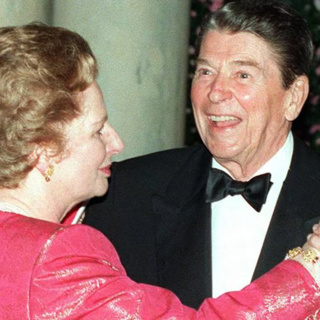
255. Maggie: lioness or poodle?
Maggie Thatcher in 1987 pulled off a trick that had eluded all other British Prime Ministers of the twentieth century: she won three general elections in a row. Even more, she won a second Commons landslide down from the 144 seats in 1983, but still massive at 102 seats. It was a remarkable feat, to set alongside her being the first woman Prime Minister of Britain, though she always preferred to present herself as the first scientist.With that huge majority, she seemed well placed to pursue her policy agenda to make Britain great again. But that’s where she ran into problems. This week, we’re going to talk about what the obstacles to her were in foreign affairs, before turning to the domestic ones next week.She had three main paths to choose between: she could go all in on the Atlantic Alliance with the US, banking on the special relationship; she could go with the Commonwealth, using that association of former imperial possessions to rebuild British global power; or she could throw the country’s lot in with Europe, sacrificing some British sovereignty to the EEC, in return, as Harold Macmillan had written quarter of a century earlier, for sharing in the sovereignty the other nations had given up.The problem was, as experience would show, that the special relationship with the US had become deeply one-sided, with the US treating Britan as very much a junior partner (which, to be fair, it was). While her backers praised her for standing up against those in parliament who resented granting the US permission to fly bombing raids against Libya from British bases, calling her a lioness in a den of Daniels, those opponents regarded her as a poodle doing the bidding of the American president. As for the Commonwealth, this loose association of nations with no real structure for taking or acting on decisions, was never going to get Britain anywhere. And when it came to Europe, Thatcher grew increasingly sceptical about the EEC as time went on, resenting any granting of authority to it outside the purely economic area.That, sadly, left Thatcher with no real option for taking things forward. Majority or not, she was increasingly boxed in. Lioness or poodle, she found her way blocked in every direction.Illustration: 'You lead and I'll follow': Thatcher dancing with Reagan, a special relationship in which the US calls all the shots. Photo by Charles Tasnadi from the Globe and Mail.Music: Bach Partita #2c by J Bu licensed under an Attribution-NonCommercial-No Derivatives (aka Music Sharing) 3.0 International License
10 Aug 14min
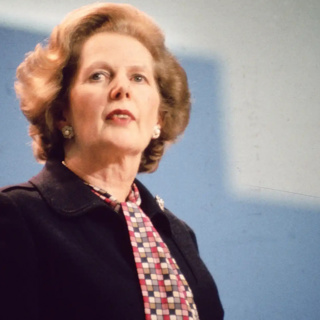
254. Maggie reaching the top
Thatcher’s victories, including a general election landslide and breaking the miners’ strike, emboldened her to launch another phase in the reduction of the role of the state in the British economy. Nationalised industries were privatised, with encouragement given to individuals to buy the shares, which they did with enthusiasm. This came on top of the continuing success of council house sales under the ‘Right to Buy’ scheme. Extending home and share ownership to far more people, from far more modest backgrounds than ever before, Thatcher claimed, was opening an era of popular capitalism.The reality, however, was more nuanced. Many buyers of shares in privatised companies sold them again, taking a quick profit, because the share price on flotation had been low and it climbed dramatically afterwards. Many owners of former social housing also sold their properties, leading to a large minority ending back again as rentals, but with private landlords not bound by the policy of affordable rents that councils had applied.Similarly, another great initiative of the Thatcher government, the deregulation of the London Stock Exchange, seemed to go brilliantly. London regained its status as a major financial centre. It would only be twenty or so years later that some of the downside emerged, when the encouragement to banks to engage in speculation became a contributing factor to the 2008 crash.The IRA was running a terrorist campaign in Britain too, one that nearly claimed Thatcher's own life, when a bomb was planted in Brighton’s Grand Hotel, where she and many leading Tories were staying for the party conference. Thatcher reacted with commendable courage and resolution at the time, and later even went so far to negotiate an Anglo-Irish agreement, again giving the Republic a consultative role in the affairs of Northern Ireland. It didn't go far enough, as the Good Friday agreement would a decade later, but it was an important step,And then there was the Westland affair, when a British helicopter manufacturer ran into difficulties, and a dispute broke out in cabinet over which two options, American or European, to back for a rescue. Ultimately, that led to the Minister of Defence, Michael Heseltine, openly defying Thatcher. That was an ominous event, a first crack in the previously apparently indestructible fortress of support for Thatcher among her colleagues.It was a foretaste of unpleasantness ahead but for the moment that was still quite a way in the future.Illustration: Margaret Thatcher in defiant mood, speaking out against terrorism at the 1984 Conservative Party conference, after the bomb attack on the Grand Hotel in Brighton. Photo from The Guardian. Music: Bach Partita #2c by J Bu licensed under an Attribution-NonCommercial-No Derivatives (aka Music Sharing) 3.0 International License
3 Aug 14min
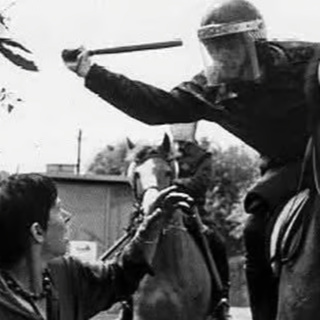
253. The Enemy Within
What had converted Maggie Thatcher from something of a lame duck into a front runner for the next British general election?While the economy had begun to pick up, that had been patchy at best, with some parts of Britain suffering badly while the general picture was improving. That’s what made me feel then, and leaves me feeling now, that it was the victory in the Falklands that made her more or less unassailable, far more than any economic achievements.The election, when it came, gave her a landslide majority in the Commons, making her the only British Prime Minister in the twentieth century to have improved her majority at her second election. But that disguises the fact that her popular vote actually fell slightly, mostly down to the impact of the SDP-Liberal Alliance, taking far more votes than the Liberals alone at the previous election. That won them a disappointing number of MPs, because of the perversity of the first past the post system, while giving her a huge victory, down to the exactly the same thing.Next, having defeated an enemy without, the Argentinians, she took on what she regarded as a more serious threat, the enemy within. That was the trade union movement and more particularly the miners. When they struck against mine closures, her smart work preparing the ground for resisting even a long strike, combined with the incompetence of a radical but inept leader of the miners’ union, Arthur Scargill, she was able to crush the strikers. A second victory in three years. But not against an external enemy. This was against the enemy within, a once proud and powerful working-class movement, now reduced to impotence.Illustration: A scene from the Battle of Orgreave between mineworker pickets and police. Photo from the Doncaster Free Press. Music: Bach Partita #2c by J Bu licensed under an Attribution-NonCommercial-No Derivatives (aka Music Sharing) 3.0 International License
27 Juli 14min
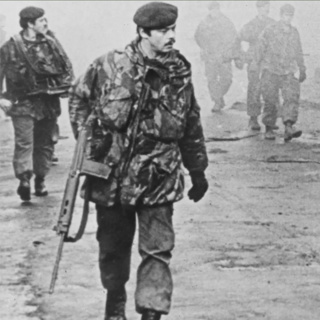
252. Iron Lady
Mrs Thatcher’s first term in office was one of the great get out of jail events. She came into office intent on braking with the Keynesianism and social democracy of the postwar consensus. She drew on the ideas of the economists Friedrich Hayek and Milton Friedman (both briefly discussed in this episode), with their championing of the free-market and, in Friedman’s case, of monetarism. Initially, however, things didn’t go well: unemployment soared, the economy shrank and even inflation, the very issue monetarism set out to tackle shot up. She maintained, however, that she had no intention of changing tack, declaring ‘the lady’s not for turning’. By 1981, she was sitting on the worst favourability ratings of any Prime Minister since records had been kept.But then the economy started to come back from recession, helped by the fact that oil began to flow from Britain’s North Sea fields, inflation fell, and her ‘right-to-buy’ scheme allowing tenants of council housing to buy their homes proved popular. Nothing, though, helped her as much as the behaviour of two enemies.Labour kept up its drift leftwards leading to its split, with the Social Democratic Party launched by some senior figures leaving the party, most notably Roy Jenkins. In alliance with the Liberals, they represented a dangerous splitting of the anti-Tory vote.Even more helpful for Thatcher, was the invasion of the Falkland Islands – or Islas Malvinas – launched by the Argentinian junta under General Galtieri. By responding with military force, and winning, she was able to turn herself into a victorious war leader and a hero to many in Britain. Her approval rating surged to 51%.Suddenly, from someone expected to lose the next general election, she’d become a practically unbeatable leader for it.Illustration: British paratroopers entering Port Stanley – Puerto Argentino – in the Falkland Islands – las Islas Malvinas – at the end of the war against Argentina for their possession. Public Domain.Music: Bach Partita #2c by J Bu licensed under an Attribution-NonCommercial-No Derivatives (aka Music Sharing) 3.0 International License
20 Juli 14min
